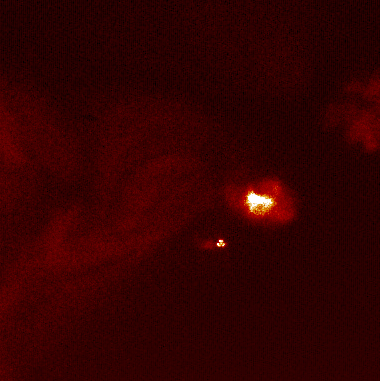
Click to zoom.
X-Ray Bokeh
|
Here's something fun: Earlier this month XRT made some observations with the telescope de-focused. When you do this, not only are the images blurry, but also you can learn about the optics of the telescope/camera system. For example, did you ever notice in a photo that points of light coming from out-of-focus raindrops (or Christmas tree lights) always look perfectly round? It's because the lens of the camera is circular, and the effect is called bokeh. Here's an example. And if you take a photo with the middle part of the lens obscured (effectively a ring-shaped lens), you get ring-shaped out-of-focus droplets: check the upper-left and lower-right edges of this photo. In fact, you can make bokeh in almost any shape, by covering your camera lens with a mask. So what happens with an X-ray telescope like XRT? The entrance aperture of the telescope is basically ring-shaped, but with three sections masked off. The bokeh for XRT thus has three little lobes, like a clover. Check out the tiny bright point just below the center of the image, and click to zoom in. A clover-shaped X-ray bokeh! (The selected image shows the big S-shaped active region only faintly, to emphasize the tiny brightening.)
Just so you know, XRT is not still de-focused, and we have no plans to do this experiment again. But the results of this data set are certainly interesting.
|
(Prepared by David McKenzie)
| Back | Archive | Next |